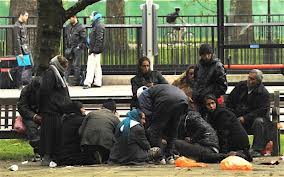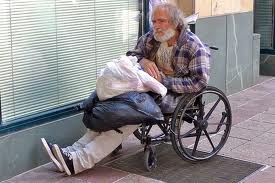.
.
10 October 2012
This morning was even colder than yesterday. I had a picture of Silver, from the funeral home. I gave it to Metro. He would have seen him every morning for nearly eleven years. Joy was wrapped in her blanket, rubbing her legs.” I wore the wrong shoes today. These Pumas, given to me by Wolf, are worth about a hundred and fifty bucks. People look at me and they figure, Why are you panhandling if you can afford shoes like that? I try to hide them, but I have to straighten my legs out to rub them every once in a while. They’re really bad today.”
“How are you and Chester getting along?”
“He got really drunk last night. I gave him some money and asked him to buy a bottle for me. He used my money to buy himself more beer. He went through an eighteen pack yesterday. Usually, after six he’ll be asleep.
“He was saying to me, ‘Joy, I love you. I wont mind if you stay after Christmas. Then he touched my leg. He hasn’t done that for a while.”
“I said to him, ‘Chester, you don’t like to be touched. I feel the same way, so keep your hands to yourself.’
“Later, he was banging around in the kitchen stark naked. He said, ‘What’s for supper?’ I told him, ‘I’m having this box of Kraft Dinner. I don’t know what your having. When are you going to buy some groceries?’ I’ve really spent a lot this month supplying him with cigarettes — and he chain smokes, one right after another. I’ve bought all the food. He hasn’t bought any.
“Well, I don’t think I’m going to be making any more money this morning. I had a good day yesterday.”
“I’ll see you later, Joy. Stella will be bringing pumpkin tarts.”
“I’ll give mine to Albert. I can’t stand pumpkin. I don’t mind the seeds, but that’s all.”
…
Later, at 10:00, I went to the park. Stella and her husband Tim were there. Stella loves to walk Weasel’s dog, Bear. She’s known him since he was a pup — at that time he was owned by Andre, who has since passed away. Stella had brought pumpkin tarts, with whipped cream, for everybody. She also brought me a package of photos and a photo copy of a newspaper article entitled, ‘Street Sister.’
Joy said, “Janice, my worker, is meeting me here to take me to my Elizabeth Fry appointment.” She poured some wine in her water bottle, added water and placed it in her bag. Little Jake, said, “can you roll me a joint?”
Janice arrived and said hello to the people she knew. Andre asked, “We’re meeting tomorrow, right? You’re coming here?”
“That’s right Andre.”
Joy asked, “How many buses do we have to take, and how far do we have to walk?”
“We can just walk down to the next cross street and board an 85. That will take us right there.”
Joy asked, “Can you just wait until I finish this joint? Then I’ll be ready to go.”
“Sure, we have time.”
Joy hoisted her heavy backpack onto her shoulders and they walked down the sidewalk towards the bus stop.
I said hello to everybody I knew. Shakes introduced me to Clifford.
He said, “So, you’re Dennis the Menace! I’m Downtown Charlie Brown. I’ve been on the street for the past few days. Before that I was in a recovery program. I’m native Algonquin. I was born, on the Madawaska River, near Algonquin Park. I have a deep history. My grandfather was a guide for the Group of Seven, from 1920 to 1933, when they painted in the park. He served three terms as National Chief of the Assembly of First Nations. I’m also related to the President of the Odawa Native Friendship Center. My father is a millionaire, but he won’t even answer the phone to me. He wont give me fifty bucks; won’t even give the price for a bottle. My sister is the same, she has a great big house; I sleep on the street. She says, ‘You got yourself this way, you get yourself out.’ ”
I said, “I’m really interested in learning about native culture. Is the Odawa Center a good place to go?”
The best place is the Aboriginal Drop-In Center. Every Wednesday the native ladies host a meal, storytelling, chanting and drumming. You’ll get to see Shakes dance, sing and play guitar.”
“Shakes,” I said. “I didn’t know you sang and played guitar.”
Clifford said, “Shakes and I used to sing in the park, He taught me some boxcar Willie and other blues songs:
Boxcar’s my home, railroad my friend
It’s been that way since I don’t know when
I’m here today, tomorrow I’m gone
Where I hang my hat is where I call home
Stars at night my roof over head
The ground below where I make my bed
Horizons you see, well that is my walls
When the sun comes up my hobo blood calls.”
“I love Boxcar Willie, and all the old blues singers.” I said.
Clifford said, “When I think of native culture I get so angry. In school the nuns forced us to speak English. They called what we spoke, ‘the devil’s language’. If we were ever caught speaking Algonquin or any other native language we would be beaten with the edge of a ruler or a leather strap. Can you imagine if something like that happened today, especially to the children of white people. The nuns would be arrested.
“All this land we’re on was given to the Algonquin by treaty, even the land where the Parliament buildings stand. The government decided that it was a good military location, so they just took it. The Rideau canal was built mostly with native labor. They were paid starvation wages, most of them had families to feed, so they’d feed their families first. Many were worked to death. There isn’t even a plaque to commemorate the natives who died.
“Most native people would rather sleep outside, than in one of the shelters. Last night the guy in the bunk on my right kept saying, ‘six, six, six, six, six…’ all night long. He never stopped. The guy on my left was a crack head. Every twenty minutes he’d get up and walk around. I didn’t trust him, so I was trying to sleep with one eye open. Whenever he got up, or went back to bed I woke up.”
…
Sample my books for free — To date, $1945.00 has been donated to the homeless:
Gotta Find a Home: Conversations with Street People
http://buff.ly/1SGzGCY ($.99 Download)
http://buff.ly/1qLHptc ($.99 Download)
https://buff.ly/2lUfp6Q ($.99 Download)
https://buff.ly/2Gkoyxj ($.99 Download)
Podcasts:http://buff.ly/1Pxlf9p
http://www.blunttalk.libsyn.com/
http://buff.ly/1XU368M
http://buff.ly/2iYvOE4
http://buff.ly/2jdjZd6







